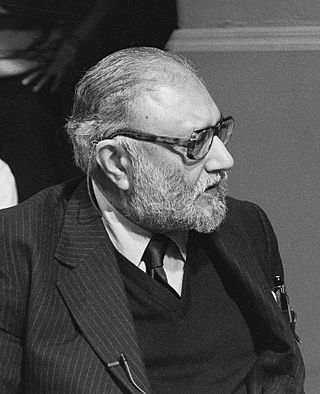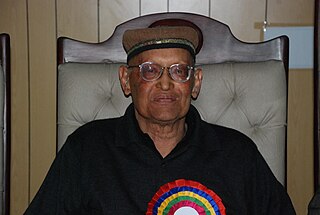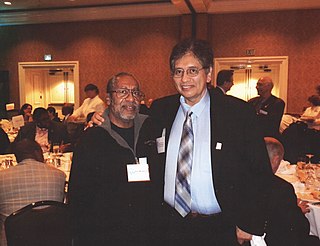Related Research Articles

Mohammad Abdus Salam was a Punjabi Pakistani theoretical physicist and a Nobel Prize laureate. He shared the 1979 Nobel Prize in Physics with Sheldon Glashow and Steven Weinberg for his contribution to the electroweak unification theory. He was the first Pakistani and the first from an Islamic country to receive a Nobel Prize in science and the second from an Islamic country to receive any Nobel Prize, after Anwar Sadat of Egypt.

Michael James Duff FRS, FRSA is a British theoretical physicist and pioneering theorist of supergravity who is the Principal of the Faculty of Physical Sciences and Abdus Salam Chair of Theoretical Physics at Imperial College London.

The Government College University, Lahore, is a public research university located in Lahore, Punjab, Pakistan. Opened as Government College, Lahore, in 1864, it became a university in 2002.

The Pakistan Institute of Nuclear Science & Technology (PINSTECH) is a federally funded multiprogram science and technology research institute managed for the Ministry of Energy by the Pakistan Institute of Engineering and Applied Sciences (PIEAS).

Muhammad Raziuddin Siddiqui was a Pakistan-born American physicist.

Science and technology is a growing field in Pakistan and has played an important role in the country's development since its founding. Pakistan has a large pool of scientists, engineers, doctors, and technicians assuming an active role in science and technology. The real growth in science in Pakistan occurred after the establishment of the Higher education Commission in 2002 which supported science in a big way and also became the major sponsor of the Pakistan Academy of Sciences under the leadership of Prof. Atta-ur-Rahman. The emphasis was placed on quality rather than numbers during this period. The quality measures introduced by Prof. Atta-ur-Rahman as Founding Chairman HEC included:1) All Ph.D. thesis were evaluated by eminent foreign scientists,2) All PhD theses and research papers were checked for plagiarism 3) Some 11,000 students were sent abroad to leading universities for PhD level training and absorbed on their return, 4) Appointments at faculty positions were linked to international stature of the applicants as judged from their international publications, patents and citations, and (5) Quality Enhancement Cells were established in all universities for the first time in the history of the country. (6) The minimum criteria for establishment of a new university were approved by the Cabinet and universities that did not meet this criteria were closed down. (7) The Model University Ordinance was approved setting the governance parameters for new universities. (8) A list of fake higher education institutions was prepared and made public. (9) Quality Assurance Agency (QAA) was set up within the Higher Education Commission that established Quality Enhancement Cells (QECs) as its operational units in public and private-sector universities across the country. (10) The funding of universities was linked to excellence in teaching and research under a formula based funding mechanism that considered enrolment, subjects and quality of teaching and research. The first IT policy and implementation strategy was approved under the leadership of Prof. Atta-ur-Rahman, then Federal Minister of Science & technology, in August 2000 which laid the foundations of the development of this sector On the request of Prof. Atta-ur-Rahman, Intel initiated a nationwide programme to train school teachers in Information and Communication technologies in March 2002 which has led to the training of 220,000 school teachers in 70 districts and cities across Pakistan. A 15-year tax holiday was approved on the recommendation of Prof. Atta-ur-Rahman which has resulted in growth of IT business from $30 million in 2001 to over $3 billion. The Pakistan Austria University of Applied Engineering (Fachhochschule) has been established in Haripur Hazara under a Steering Committee Chaired by Prof. Atta-ur-Rahman in which students will get degrees from several Austrian universities. Pakistan's growth in scientific output can be seen from the fact that in 1990 Pakistan published 926 scholarly documents while in 2018 the number rose to 20548, a twenty times increase.In contrast India published 21443 scholarly documents in 1990 and the number rose to 171356 in 2018, an eight times increase. In 2018, 336 people per million were researchers in the R&D in Pakistan compared to 256 people per million being researchers in India. The reforms begun by Prof. Atta-ur-Rahman FRS in 2003-2008 have continued over the subsequent decade and according to the Web of Science report, there was a 300% growth in research publications in 2019 over the decade, with 2019 marking the first year in which Pakistan was ranked above the world average in research. In 2019, Pakistan produced 300% more publications indexed in the Web of Science Core Collection than in 2010. In the decade of 2010-2019, more than half of Pakistan’s research was published in journals with Impact Factor. The global influence of Pakistan’s research is increasing as scientists in the country are publishing more in top quartile journals. The Category Normalized Citation Impact of Pakistan’s publications has risen from 0.67 to 1.03. output. As of 2020, Pakistan has 85% teledensity with 183 million celllular, 98 million 3G/4G and 101 million broadband subscribers, due to the foundations laid by Prof. Atta-ur-Rahman of the IT and telecom industry during 2000-2008. In an analysis of scientific research productivity of Pakistan, in comparison to Brazil, Russia, India and China, Thomson Reuters has applauded the developments that have taken place as a result of the reforms introduced by Prof. Atta-ur-Rahman FRS, since Pakistan has emerged as the country with the highest increase in the percentage of highly cited papers in comparison to the "BRIC" countries

Riazuddin, also spelled as Riaz-Ud-Din, was a Pakistani theoretical physicist, specialising in high-energy physics and nuclear physics. Starting his scientific research in physics in 1958, Riazuddin was considered one of the early pioneers of Pakistan's nuclear weapons development and atomic deterrence development. He was the director of the Theoretical Physics Group (TPG) of the Pakistan Atomic Energy Commission (PAEC) from 1974 until 1984. Riazuddin was a pupil of the winner of the 1979 Nobel Prize in Physics, Abdus Salam.

The Abdus Salam Centre for Physics, is a federally-funded research institute and national laboratory site managed by the Quaid-i-Azam University for the Ministry of Energy (MoE) of the Government of Pakistan.
The International Nathiagali Summer College on Physics and Contemporary Needs (INSC), was founded by Nobel laureate in Physics Dr. Abdus Salam to promote physics and scientific research activities in Pakistan. Having suggested by Professor Abdus Salam to the Government of Pakistan, it was established by the Pakistan Atomic Energy Commission's chairman Mr. Munir Ahmad Khan.
Qaiser Mushtaq, , is a Pakistani mathematician and academic who has made numerous contributions in the field of Group theory and Semigroup. He has been vice-chancellor of The Islamia University Bahawalpur from December 2014 to December 2018. Mushtaq is one of the leading mathematicians and educationists in Pakistan. Through his research and writings, he has exercised a profound influence on mathematics in Pakistan. Mushtaq is an honorary full professor at the Mathematics Division of the Institute for Basic Research, Florida, US.

Asghar QadirHI, SI, FPAS, is a Pakistani mathematician and a prominent cosmologist, specialised in mathematical physics and physical cosmology. He is considered one of the top mathematicians in Pakistan. He served as the chairman of the Mathematics Department, and the director of School of Natural Sciences (SNS) at the National University of Sciences and Technology (NUST). He is currently working as a visiting professor at Abdus Salam School of Mathematical Sciences, Government College University, Lahore.
Fayyazuddin, also spelled as Fayyaz Uddin, is a Pakistani theoretical physicist, emeritus professor, specialising in theoretical physics and mathematical physics at Quaid-e-Azam University campus National Centre for Physics, Islamabad. He is a senior scientist at the National Center for Physics. Fayyaz is doing research in the fields of quantum mechanics, particle physics, and meson physics. He has published numerous physics papers accompanied by Riazuddin and has co-authored Quantum Mechanics by Fayyazuddin and Riazuddin published in 1990.
Tasneem Zehra Husain is a Pakistani theoretical physicist. She is one of few Pakistani women to obtain a doctorate in physics, and the first Pakistani woman string theorist. An eminent scientist, she has been a guest speaker at a various schools and colleges in an effort to promote science and technology in Pakistan.
Tasawar Hayat is a Pakistani mathematician who has made pioneering research contributions to the area of mathematical fluid mechanics. He is considered one of the leading mathematicians working in Pakistan and currently is a Professor of Mathematics at the Quaid-i-Azam University.
The Abdus Salam Award, is a most prestigious award that is awarded annually to Pakistani nationals to the field of chemistry, mathematics, physics, biology. The award is awarded to the scientists who are resident in Pakistan, below 35 years of age on 31 December of the year for which the Prize was to be awarded. It is to consist of a certificate giving a citation and a cash award of US$1,000. It is to be awarded on the basis of the collected research and/or a technical essay written specially for the Prize
Tasneem Mohammad Shah, SI, TI, was a Pakistani scientist and a prominent mathematician who has made pioneering and instrumental research and contributions to the field of computational fluid dynamics (CFD) at A. Q. Khan Research Laboratories (KRL). Trained as an applied mathematician, his contributions include differential geometry, numerical analysis, information security, CFD-DEM model, hydrodynamics, computer science, fluid mechanics, Vacuum Technology and CFD-DEM.
The Abdus Salam School of Mathematical Sciences (AS-SMS), is an autonomous institute affiliated with the Government College University Lahore, Pakistan. The school is named after the theoretical physicist and Nobel Laureate Abdus Salam.
The Abdus Salam Chair in Physics, also known as Salam Chair in Physics, is an academic physics research institute of the Government College University at Lahore, Punjab province of Pakistan. Named after Pakistan's only Nobel Laureate, Abdus Salam, the institute is partnered with the Pakistan Atomic Energy Commission (PAEC) and International Center for Theoretical Physics (ICTP). While it is a physics research institute, the institute is dedicated to the field of Theoretical and Mathematical physics.

Ronald Elbert Mickens is an American physicist and mathematician who is the Fuller E. Callaway Professor of Physics at Clark Atlanta University. His research focuses on nonlinear dynamics and mathematical modeling, including modeling epidemiology. He also has an interest in the history of science and has written on the history of black scientists. He is a fellow of the American Physical Society and served as the historian of the National Society of Black Physicists. He has made significant contributions to the theory of nonlinear oscillations and numerical analysis.
References
- 1 2 "Adhering Organization of IMU on Pakistan". The International Mathematical Union. Retrieved 25 August 2016.
- 1 2 3 4 "National Mathematical Society of Pakistan". Directorate of the National Mathematical Society of Pakistan. Retrieved 17 January 2012.
- ↑ "First recipient of ASSH". Dawn Magazine. 10 March 2016. Retrieved 25 August 2016.
- ↑ "First recipients of Abdus Salam Medal". Dawn Magazine. 18 February 2018. Retrieved 27 January 2021.